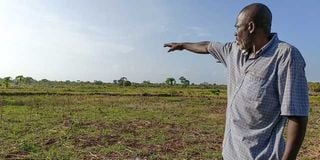Farmers at a loss as vanishing rivers trigger hunger in Vanga

Mr Feruz Mohammed, a rice farmer in Vanga, points at empty paddy fields in the village last month.
What you need to know:
- Today, the plains are barren and the paddy fields empty.
- Unchecked human activity has degraded the forest in Mt Usambara, leading to a reduction of water in River Umba, explains soil expert and irrigation engineer Evans Nyamori.
- Additionally, soil erosion on the mountain’s slopes due to lack of vegetation has led to massive siltation of the river, which has changed its course on its journey to the Indian Ocean where it drains its waters. This has affected the livelihoods of over 3,000 farmers.
It’s a devastation that has left residents of Vanga Bay near the Kenya-Tanzania border reeling under the yoke of poverty. Ms Mwanaisha Haroni, 70, is living the tragedy, her gnarled hands twisting the bristles of a new grass broom she is weaving for sale to make ends meet.
This activity has become her new pastime as her main source of living, rice farming, is no longer tenable. Streams and rivers are drying up due to rising temperatures and crops that used to grow in the coastal ecological zones, including rice, are disappearing.
Five years ago, Ms Haroni would be irrigating her rice farm using water from River Umba, whose source is in Mt Usambara in neighbouring Tanzania. It would be almost harvest time.
Today, the plains are barren and the paddy fields empty.
Unchecked human activity has degraded the forest in Mt Usambara, leading to a reduction of water in River Umba, explains soil expert and irrigation engineer Evans Nyamori.
Additionally, soil erosion on the mountain’s slopes due to lack of vegetation has led to massive siltation of the river, which has changed its course on its journey to the Indian Ocean where it drains its waters. This has affected the livelihoods of over 3,000 farmers. Studies show water temperatures in the Indian Ocean have been rising, which has depleted fish stocks.
“In the good old days, my husband and his fellow fishermen would not last more than an hour in the ocean before they caught enough fish for our food as well as for sale,” Ms Haroni says, adding: “Today, it is difficult to catch a basketful.”
Irrigation schemes
Vanga Rice Farmers Association Chairperson Juma Mwaganje says the area used to have five irrigation schemes — Wagga (105 hectares), Machame (75 hectares), Vichigini (65 hectares), Matoroni (70 hectares) and Mpepeni (75 hectares), enough to meet the rice needs for the entire Coast region.
A kilogramme sold for Shs20 compared to Sh200 today.
“I cannot believe that rice has become so expensive yet I used to harvest a new crop before the previous harvest could run out in the store,” says Mr Mwaganje.
Mr Nyamori, who is overseeing the reconstruction of the canals in Vanga Bay, blames their troubles on poor farming practices upriver. He says the change from the cultivation of rice to other economic activities like sand harvesting has made a bad situation worse.
“Sand-harvesting and relocation of residents closer to River Umba are encouraging soil loss with the productive soil getting swept into the river and eventually emptied into the Indian Ocean,” he says.
Mr Feruz Mohammed laments that the county government is silent on how it intends to address the challenges facing rice farmers in Vanga Bay.
“It is sad that, even as our people are faced with hunger, we are not considered in the relief food distribution. Maize flour which is now becoming our staple food is very expensive,” Mr Mohammed says.
The authorities, he adds, should consider building a dam in the area to ease the pressure exerted on River Umba.
For now, Vanga rice farmers are looking for alternative sources of income. Ms Fatuma Bakari, for instance, is hawking food on her veranda targeting fishermen from Tanzania who camp in Vanga to catch sardines.
She says she used to hate ugali, but it is now her only food.
“I was seldom worried about lacking money to buy other types of food but today I have no alternative. I now plant peas and maize, which are not as appealing as rice,” says Ms Bakari.





